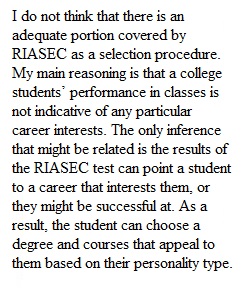


Q *Submit on Blackboard using Turnitin **Answer the questions on a blank page of this document. Keep the requirements in mind (.5 pages, double spaced, 12-point Times New Roman, 1” margins, not including title page or references). Instructions. 1. For questions 2-4, use the RIASEC career interests and your job as a college student. Information on the RIASEC can be found at the bottom of this document. 2. Content validation a. Is an adequate portion of college student’s job performance covered by using RIASEC career interests as a selection procedure? Why or why not? I do not think that there is an adequate portion covered by RIASEC as a selection procedure. My main reasoning is that a college students’ performance in classes is not indicative of any particular career interests. The only inference that might be related is the results of the RIASEC test can point a student to a career that interests them, or they might be successful at. As a result, the student can choose a degree and courses that appeal to them based on their personality type. 3. Criterion-related validation a. What are the weaknesses of concurrent validation? A few weaknesses of concurrent validation are it is not as effective in its ability to predict future performance or success and it is not as intensive as predictive validity therefore does not provide as reliable results. 4. Empirical consideration in criterion-related validation a. Using data from 51 students in my courses, I computed validity coefficients (i.e., correlations) for the RIASEC career interests and group rated performance and can be found in Table 1 below. b. Interpret the sign and magnitude of the validity coefficients (i.e., correlation) for the Realistic interests and group rated performance found in table 1. The correlation between the realistic interests and group performance is significant yet negative since the line is regressing in a downward trend. c. Interpret the regression line of Realistic interests and group rated performance found in Figure 1. The regression line of realistic interests and group performance is negative and in a downward trend. d. What are the problems with using small datasets? One issue with using small datasets is there is not enough information to adequately represent the disbursement of data. Some other issues include outliers, measurement errors, or even sampling bias. The more data or information, the more reliable and effective the results are. Table 1.Correlations and Coefficients of Determination for Team Ratings of Job Performance Realistic Investigative Artistic Social Enterprising Conventional Correlation -.30* -.25 -.23 -.08 -.22 -.25 * Correlation is significant at the .05 level (2-tailed). Figure 1. Regression line for Realistic Interests and Team Ratings of Job Performance ? Descriptions of the Holland Codes (RIASEC) • Realistic people are usually assertive and competitive, and are interested in activities requiring motor coordination, skill and strength. People with a realistic orientation usually prefer to work a problem through by doing something, rather than talking about it, or sitting and thinking about it. They like concrete approaches to problem solving, rather than abstract theory. They tend to be interested in scientific or mechanical rather than cultural and aesthetic areas. They like to work with THINGS. • Investigative people like to think and observe rather than act, to organize and understand information rather than to persuade. They tend to prefer individual rather than people oriented activities. They like to work with DATA. • Artistic people are usually creative, open, inventive, original, perceptive, sensitive, independent and emotional. . They do not like structure and rules, like tasks involving people or physical skills, and are more likely to express their emotions than others. They like to think, organize and understand artistic and cultural areas. They like to work with IDEAS and THINGS. • Social people seem to satisfy their needs in teaching or helping situations. They are different than R and I Types because they are drawn more to seek close relationships with other people and are less apt to want to be really intellectual or physical. They like to work with PEOPLE. • Enterprising people are good talkers, and use this skill to lead or persuade others. They also value reputation, power, money and status, and will usually go after it. They like to work with PEOPLE and DATA • Conventional people like rules and regulations and emphasize self-control. They like structure and order, and dislike unstructured or unclear work and interpersonal situations. They place value on reputation, power, or status. They like to work with DATA. Obtained from http://www.roguecc.edu/counseling/hollandcodes/about.asp
View Related Questions